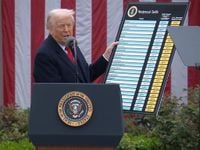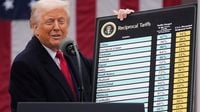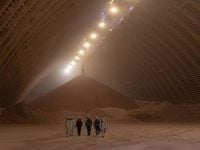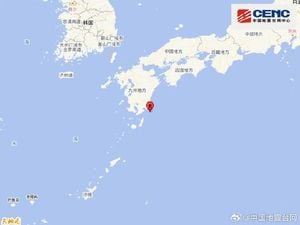On April 2, 2025, Canada found itself in a favorable position as U.S. President Donald Trump announced that the country would avoid new tariffs, a move that many are interpreting as a diplomatic victory amid ongoing trade tensions. Trump, who had previously threatened new tariffs against Canada, instead declared the day as a moment of economic independence for the United States.
During a ceremony in the White House Rose Garden, Trump proclaimed April 2 as "Liberation Day" and introduced a 10% tariff on imports from various countries, but notably exempted Canada and Mexico from these new charges. This decision comes after months of speculation about potential tariffs on Canadian goods, particularly in the dairy sector where Trump accused Canada of imposing tariffs as high as 250% to 300% on U.S. dairy products.
"Canada, by the way, imposes a 250% to 300% tariff on many of our dairy products. They do the first can of milk, they do the first little carton of milk at a very low price and after that it gets bad," Trump stated, highlighting his administration's ongoing concerns about trade imbalances.
Despite the absence of new tariffs, existing tariffs on steel and aluminum remain unchanged, with a 25% duty still in effect for these products. Additionally, the U.S. continues to impose tariffs on fentanyl-related imports, which also affect Canada. However, goods compliant with the Canada-United States-Mexico Agreement (CUSMA), also known as USMCA, will remain tariff-free, allowing Canadian products like automobiles and potash to enter the U.S. market without additional costs.
Prime Minister Mark Carney cautiously welcomed the news, acknowledging that Canada was spared from new tariffs but emphasizing the need to address the existing tariffs on steel and aluminum. "President Trump has just announced a series of measures that are going to fundamentally change the international trading system," Carney remarked, insisting that Canada must remain vigilant in its trade negotiations.
Conservative Leader Pierre Poilievre also weighed in, criticizing all of Trump’s tariffs as unjustified. He called for Canada to build an economy that can withstand threats from the U.S. and urged for a new trade deal to eliminate existing tariffs. "We must be an economic fortress that can defend itself, that can stand up for its own people and put Canada first," Poilievre stated during a rally in Kingston.
In the context of potash, which is a major export for Canada, the situation is particularly crucial. The U.S. currently imposes a 10% tariff on Canadian potash imports, a rate that had previously been set at 25% before being lowered following pushback from various industries, including farming. Eighty-five percent of potash imported into the U.S. comes from Canada, and any tariffs could significantly impact American farmers who rely on this crucial fertilizer.
Ken Seitz, CEO of Nutrien Ltd., the world’s largest potash producer based in Saskatchewan, indicated that the cost of tariffs would ultimately be passed on to U.S. farmers. "The cost of tariffs will be borne by farmers in the U.S.; that’s our view," he noted, reinforcing concerns that tariffs could exacerbate the financial struggles of American agricultural producers.
Looking ahead, both Canadian and U.S. officials are bracing for potential changes in the global potash market, particularly with the ongoing conflict in Ukraine affecting fertilizer supplies from Russia and Belarus. As markets shift, Canadian potash may find new demand in regions like Brazil and Southeast Asia, with companies like Nutrien anticipating growth opportunities.
Alberta Premier Danielle Smith celebrated the U.S. decision to maintain CUSMA provisions, which secure tariff-free access for most Canadian goods. She described the outcome as a triumph of diplomacy, although she acknowledged that challenges remain regarding tariffs on automobiles, steel, and aluminum. "Today was an important win for Canada and Alberta, as it appears the United States has decided to uphold the majority of the free trade agreement (CUSMA) between our two nations," Smith stated.
Despite the positive developments, Smith emphasized the need for Canada to reduce its economic reliance on the U.S. and called for bold steps to enhance national independence. She proposed fast-tracking national resource corridors and removing barriers to provincial resource development to fortify Canada’s position as an energy superpower.
As the trade landscape continues to evolve, the ongoing negotiations and decisions on tariffs will play a critical role in shaping the economic futures of both Canada and the United States. With the specter of new tariffs always looming, Canadian officials are determined to protect their interests while navigating the complexities of international trade relations.








